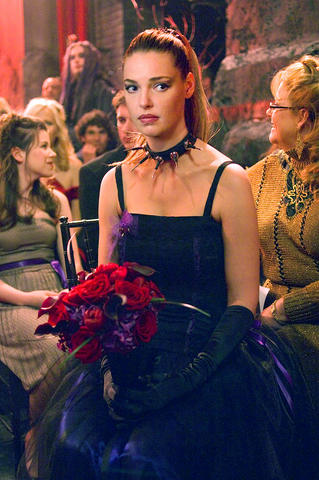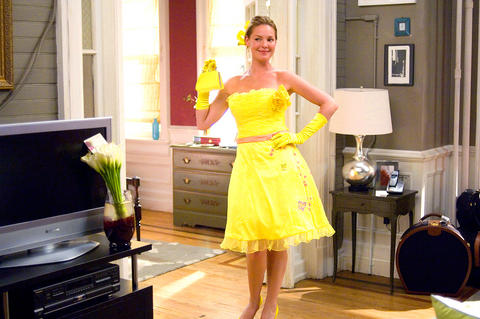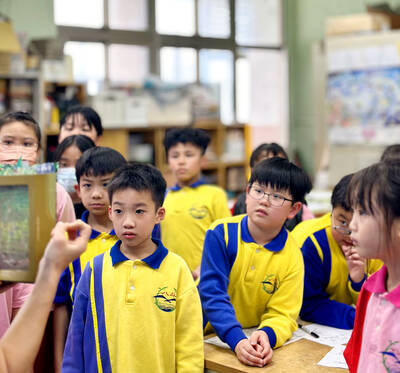At the beginning of 27 Dresses, Jane (Katherine Heigl), a serial bridesmaid with an almost pathological devotion to other people's nuptials, spends a long night shuttling between two weddings. One is in Midtown Manhattan, the other in Brooklyn; one has an upper-crusty, white-bread look, while the other appears to be a Jewish-Hindu intermarriage. But as director Anne Fletcher methodically cuts back and forth between them, she makes the reasonably insightful, moderately funny point that modern American weddings, however they may strain for individuality and specialness, are all pretty much alike.
The problem is that much the same could be said about modern American romantic comedies. There is a touch of idiosyncrasy here and there - in this one the heroine's dad is a widower who owns a hardware store - but most of the elements might as well have been pulled off the registry list at a high-end chain store.
The template is something like this: A career woman who lives in a bright and perky city (though usually not the one in which it was filmed; most of this Manhattan is actually Providence, Rhode Island) takes a bit under two hours to make it to the altar with (or at least be stopped at the airport by) the Right Guy, who had seemed at first to be the Wrong Guy. Earlier, the Wrong Guy had seemed to be the Right Guy.

PHOTOS: COURTESY OF FOX
For ease of reference let's call the one the heroine ends up with the Right Wrong Guy and the one she rejects the Wrong Right Guy. In the case of 27 Dresses the Right Wrong Guy is James Marsden, who recently played the Wrong Right Guy in Enchanted, while the Wrong Right Guy is Edward Burns, who gets to be the Right Wrong Guy mostly in movies he writes and directs himself.
The best thing about 27 Dresses, which was written by Aline Brosh McKenna (whose script adaptation of The Devil Wears Prada was far more witty and interesting), is that the Guys are not really the point. Or rather, if getting the Right one is the point of the story (see above), the spark of comedy is carried by the women in the picture.
Too bad it's such a dim spark. Heigl, the blossoming babymama in Knocked Up, has an impressive gift for mugging. Her eyebrows shoot up and scrunch downward with amazing precision, and her mouth contorts itself amusingly when she says things like "gewurztraminer," "hot hate sex" and "I'm Jesus."

PHOTO: COURTESY OF FOX
Which may make the movie sound more interesting than it is. To allay that impression, let me just note that the big comic-romantic set piece comes when Jane and the Right Wrong Guy get drunk at a suburban roadhouse and sing Benny and the Jets while dancing on the bar. At least it wasn't YMCA or I Got You (I Feel Good), but still.
Back at the office Jane has the requisite slutty/flaky best friend, who at least is played by the irrepressible Judy Greer (13 Going on 30). Jane's sister, Tess - her rival, as it happens, for the love of the Wrong Right Guy - is Malin Akerman, who was the only remotely funny thing about The Heartbreak Kid, in which she played the Wrong Right Girl.
Why Fletcher and McKenna couldn't have supplied these three funny, charming women with a funny, charming movie is something of a puzzle. Or maybe it isn't, since their task seems to have been to produce a movie that wouldn't make all the other movies exactly like it too envious.
Heigl certainly works hard to convince the audience of the existence of a universe in which she could be the dowdier, shyer member of a pair of sisters. The costume designer, Catherine Marie Thomas, worked at least as hard to find a dress (out of the 27 in the title) that might make Heigl look less than gorgeous. A futile effort, like most of the rest of the movie, or the attempt to find anything else to say about it.

May 26 to June 1 When the Qing Dynasty first took control over many parts of Taiwan in 1684, it roughly continued the Kingdom of Tungning’s administrative borders (see below), setting up one prefecture and three counties. The actual area of control covered today’s Chiayi, Tainan and Kaohsiung. The administrative center was in Taiwan Prefecture, in today’s Tainan. But as Han settlement expanded and due to rebellions and other international incidents, the administrative units became more complex. By the time Taiwan became a province of the Qing in 1887, there were three prefectures, eleven counties, three subprefectures and one directly-administered prefecture, with

It’s an enormous dome of colorful glass, something between the Sistine Chapel and a Marc Chagall fresco. And yet, it’s just a subway station. Formosa Boulevard is the heart of Kaohsiung’s mass transit system. In metro terms, it’s modest: the only transfer station in a network with just two lines. But it’s a landmark nonetheless: a civic space that serves as much more than a point of transit. On a hot Sunday, the corridors and vast halls are filled with a market selling everything from second-hand clothes to toys and house decorations. It’s just one of the many events the station hosts,

Two moves show Taichung Mayor Lu Shiow-yen (盧秀燕) is gunning for Chinese Nationalist Party (KMT) party chair and the 2028 presidential election. Technically, these are not yet “officially” official, but by the rules of Taiwan politics, she is now on the dance floor. Earlier this month Lu confirmed in an interview in Japan’s Nikkei that she was considering running for KMT chair. This is not new news, but according to reports from her camp she previously was still considering the case for and against running. By choosing a respected, international news outlet, she declared it to the world. While the outside world

Through art and storytelling, La Benida Hui empowers children to become environmental heroes, using everything from SpongeBob to microorganisms to reimagine their relationship with nature. “I tell the students that they have superpowers. It needs to be emphasized that their choices can make a difference,” says Hui, an environmental artist and education specialist. For her second year as Badou Elementary’s artist in residence, Hui leads creative lessons on environmental protection, where students reflect on their relationship with nature and transform beach waste into artworks. Standing in lush green hills overlooking the ocean with land extending into the intertidal zone, the school in Keelung